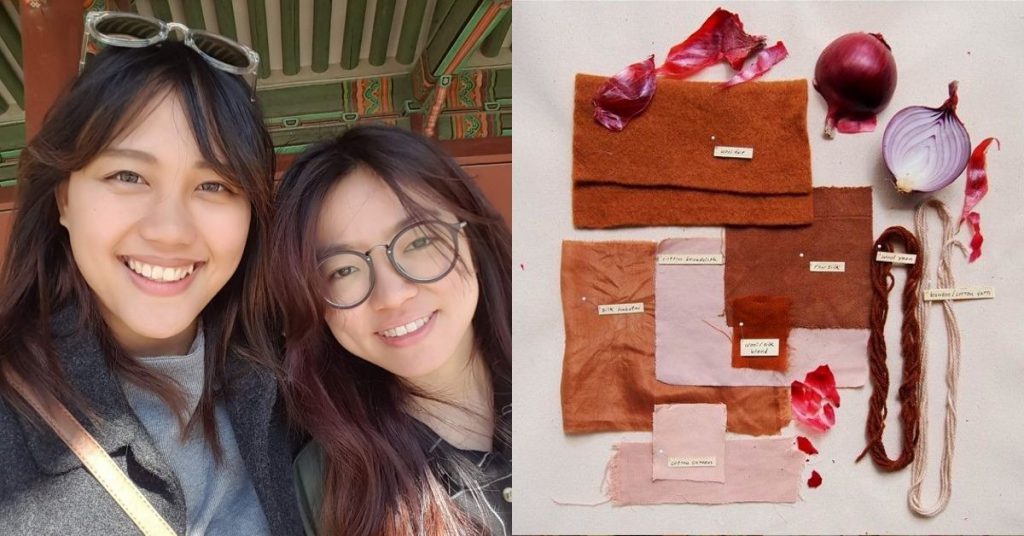When it comes to upcycling waste from food like an orange’s skin, vegetable stems, and banana peels, one way I can think of is using them as compost. It’s a win-win solution as I wouldn’t have to spend on buying fertiliser for my plants.
However, there’s another use for such waste and it’s in the form of fabric dye, which is what TwoFrens is trying to achieve by using natural ingredients as fabric dye for their products.
Caring For Your Own Garden First
As far as creative business names are concerned, TwoFrens sums up its founders. The partners behind it are Shuway and Shook.
They come from a background in business and architecture respectively, paired with a passion for environmental sustainability.
Shook herself was inspired by sustainable architectural concepts which emphasise building designs that reduce negative impacts on the environment.
While chatting one day in 2020, they arrived at the idea of starting a business together. They identified some common values they shared and explored different avenues of businesses to pursue.
Eventually, the pair arrived at the conclusion to start a natural dye business.

“The reason we chose fashion is because the manufacturing and the chemical dyeing of clothing have the highest chemical pollution and clean water waste,” Shuway explained to Vulcan Post.
“Also, with fast fashion being a trend nowadays, we wanted to showcase to others that there is a natural dye option which helps the environment and reduces pollution too.”
While it’s impossible to stop consumers from shopping, TwoFrens is mostly offering an alternative that’s less harmful to the environment.
RM2 from every transaction is also donated to the Malaysian Nature Society in helping conserve the forest to save endangered species and their habitats.
“The reason we chose a local not-for-profit instead of an international one is because we believe we should take care of our backyard first,” she said.
Giving Onion Skin A Second Life
To create the fabric dyes, unwanted flowers and vegetables are sourced from their own homes.
“Take onion skin for example, we started off using the ones from our homes, but eventually, when we had more orders coming in, we went to the market and sourced them there,” said Shuway.
They’ve expanded to purchasing produce nearing their expiry dates, as grocery stores tend to sell them at reduced rates. This is because if fresh ones are bought instead, it defeats the purpose of the brand.
For flower pigments, they use unwanted flowers and leaves from local florists, giving their waste a second life.

However, the search for ingredients was one of their biggest struggles when travel was restricted during the MCO. Despite reaching out to cafés and other businesses on collecting their food waste, they were often left hanging with no replies.
Thankfully, they were approached by a small Instagram business, Zenboocha, asking if TwoFrens wanted her used tea leaves and rosebuds for their natural dye.
A fabric’s longevity and whether the dye will fade are commonly asked questions from the community, according to the pair.
Shuway told Vulcan Post that when compared to synthetic dye, both will fade overtime and it’s highly dependent on the way it’s cared for.
So for every purchase, care and wash instructions are sent out that include warnings such as no bleaching and no exposure to direct sunlight.
Aiming For A Sustainable Brand

As the two have full-time jobs, they only work on TwoFrens over the weekend. Though the work is hectic and demands no rest days, they consider it a “happy tired” and are driven by their passion for it.
What keeps them going is the excitement that comes with successful experiments with natural dyes.
More than turning daily food waste into dyes, they realised their actions not only reduce waste but also repurpose existing household ones.
Their products available for purchase are T-shirts and tote bags costing between RM35 to RM85, which can be found on their Instagram profile.
Hairbands and scarves are currently in the works and will be sold in months to come as well.
For now, the cotton fabrics used by TwoFrens are purchased as new. Though it sort of defeats the purpose of their brand—re: buying expiring produce—they ensure that the fabric can still be recycled easily.

“In the future, we will definitely explore recycled and upcycled materials. But with the current tricky situation, we are always in the ‘wait-and-see’ situation for the search and the collection of recycled and upcycled fabrics,” Shuway told Vulcan Post.
TwoFrens also has plans to eventually open up and conduct workshops so people can learn how to create their own natural dye for fabrics.
TwoFrens has not broken even so far, since Shuway said that it will take time to convince more Malaysians to accept the concept of natural dye with botanic pigments.
Also Read: 4 Key Steps To Prepare M’sian Businesses For 2021, Based On A HSBC Survey
Featured Image Credit: Shuway and Shook, co-founders of TwoFrens












